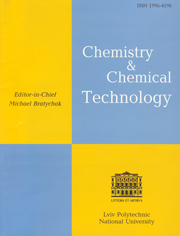Cellulose Acetate Hollow Fiber Membranes from Banana Stem Fibers Coated by TiO2 for Degradation of Waste Textile Dye
| Attachment | Size |
|---|---|
| 1.14 MB |
[1] Gupta V., Pathania D., Agarwal S., Singh P.: J. Hazard. Mater., 2012, 243, 179. https://doi.org/10.1016/j.jhazmat.2012.10.018
https://doi.org/10.1016/j.jhazmat.2012.10.018
[2] Verma A., Dash R., Bhunia P.: J. Environ. Manage. 2012, 93, 154. https://doi.org/10.1016/j.jenvman.2011.09.012
https://doi.org/10.1016/j.jenvman.2011.09.012
[3] Anjaneya O., Yogesh Souche S., Santhoshkumar M., Karegoudar T.: J. Hazard. Mater., 2011, 190, 351. https://doi.org/10.1016/j.jhazmat.2011.03.044
https://doi.org/10.1016/j.jhazmat.2011.03.044
[4] Fatimah I., Sugiharto E., Wijaya K. et al.: Indones. J. Chem, 2006, 6, 38. https://doi.org/10.22146/ijc.21770
https://doi.org/10.22146/ijc.21770
[5] Tapalad T., Neramittagapong A., Neramittagapong S., Boonme M.: Chiang Mai J. Sci., 2008, 35, 63.
[6] Zhang H., Quan Z., Chen S. et al.: Sep. Purif. Technol., 2006, 50, 147. https://doi.org/10.1016/j.seppur.2005.11.018
https://doi.org/10.1016/j.seppur.2005.11.018
[7] Zhao C., Xue J., Ran F., Sun S.: Progr. Mater. Sci., 2013, 58, 76. https://doi.org/10.1016/j.pmatsci.2012.07.002
https://doi.org/10.1016/j.pmatsci.2012.07.002
[8] Zhang X., Wang D., Lopez D., da Costa J.: J. Chem. Eng, 2014, 236, 314. https://doi.org/10.1016/j.cej.2013.09.059
https://doi.org/10.1016/j.cej.2013.09.059
[9] Mozia S., Toyoda M., Tsumura T. et al.: Desalination, 2007, 212, 141. https://doi.org/10.1016/j.desal.2006.10.007
https://doi.org/10.1016/j.desal.2006.10.007
[10] Essawy A., A.El-Hag A., Abdel-Mottaleb M. et al.: J. Hazard. Mater., 2008, 157, 547. https://doi.org/10.1016/j.jhazmat.2008.01.072
https://doi.org/10.1016/j.jhazmat.2008.01.072
[11] Grzechulska-Damsel J., Tomaszewska M., Morawski A.: Desalination, 2009, 241, 118. https://doi.org/10.1016/j.desal.2007.11.084
https://doi.org/10.1016/j.desal.2007.11.084
[12] Kutti L.: Cellulose, Starch and Their Derivatives for Industrial Applications. Doctoral thesis. VTT Technical Research Centre of Finland, Helsinki 2013.
[13] Wafiroh S., Harsasi S., Puji L.: Mal. J. Fund. Appl. Sci., 2014, 10, 119. https://doi.org/10.11113/mjfas.v10n3.264
https://doi.org/10.11113/mjfas.v10n3.264
[14] Jiangfeng Y., Wang K., Ren M. Jefferson et al.: J. Membr. Sci., 2012, 421, 8. https://doi.org/10.1016/j.memsci.2012.03.069
https://doi.org/10.1016/j.memsci.2012.03.069
[15] Drioli E., Giorno L.: Membrane Operations Innovative Separations and Transformations. Wiley-VCH Verlag GmbH & Co, Weinheim 2009. https://doi.org/10.1002/9783527626779
https://doi.org/10.1002/9783527626779
[16] Jayakumar R., Ramachandran R., Divyarani V. et al.: Int. J. Biol. Macromol., 2011, 48, 336. https://doi.org/10.1016/j.ijbiomac.2010.12.010
https://doi.org/10.1016/j.ijbiomac.2010.12.010
[17] Abedini R., Mousavi S., Aminzadeh R.: Chem. Ind. Chem. Eng. Q., 2012, 18, 385. https://doi.org/10.2298/CICEQ111202014A
https://doi.org/10.2298/CICEQ111202014A
[18] Zugenmaier P.: Crystalline Cellulose and Derivates, Characterization and Structures. Wood Science, Verlag Berlin Heidelberg 2009. https://doi.org/10.1007/978-3-540-73934-0
https://doi.org/10.1007/978-3-540-73934-0
[19] Nikolić G.: Fourier Transforms - New Analytical Approaches and FTIR Strategies, InTech, Croatia 2011. https://doi.org/10.5772/2040
https://doi.org/10.5772/2040
[20] Baker R.: Membrane Technology and Applications, 2nd edn. John Wiley & Sons Ltd., Chinister 2004.
[21] Granstrom M.: Cellulose Derivate: Synthesis, Properties and Applications. Academic Dissertation. University of Helsinki, Helsinki 2009.
[22] Zhang X., Wen Y., Yang Y., Liu L.: J. Macromol. Sci. B, 2008, 47, 1039. https://doi.org/10.1080/00222340802266298
https://doi.org/10.1080/00222340802266298
[23] Rahmawati F., Fadillah I., Mudjijono M.: J. Mater. Environ. Sci., 2017, 8, 389.










